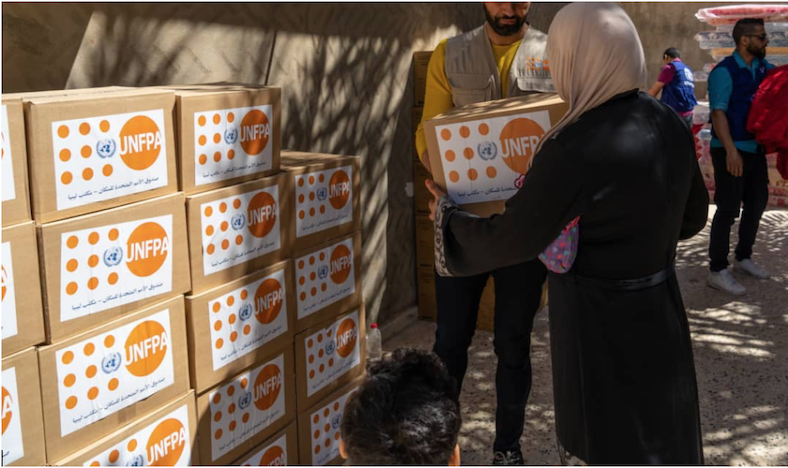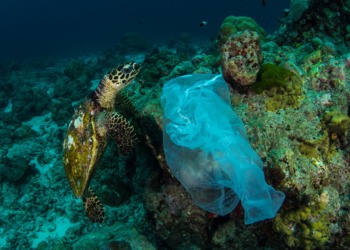“We are a rich country but we are poor people,” said one of the internally-displaced women who found shelter in a school in Tripoli.
“How can I give a future to my girls? I am spending all my money on surviving and rebuilding a house instead of on their education. I am scared for them- they are young and beautiful, you know what I mean…” stated another woman, divorced, who had been displaced for the third time with her two teenage daughters.
Over 90,000 people have been displaced in and around Tripoli since heavy clashes erupted on the 4th of April 2019 between the Libyan National Army (LNA) and armed groups affiliated with the Government of National Accord (GNA). Over 37,000 women of reproductive age need immediate humanitarian assistance and are at heightened risk of abuse. Women and girls who have fled their homes are particularly vulnerable and require specific support with basic personal items to maintain their health and hygiene while being displaced.
UNFPA, the United Nations Population Fund, has continued to support vulnerable, displaced households with a focus on women and girls since the early stages of the Tripoli conflict. As of July 2019, through its local partners, UNFPA directly assisted more than 7,000 displaced women, girls, and newborns. Mobile teams of psychosocial support counsellors were deployed through local partners in collective shelters and urban settlements. They provided psychosocial support services, including group and individual counseling, recreational activities, and awareness-raising workshops. In addition, dignity kits and baby kits containing essential hygiene items for women and newborns were distributed by UNFPA through the Rapid Response Mechanism (RRM) which was jointly implemented with sister UN agencies.
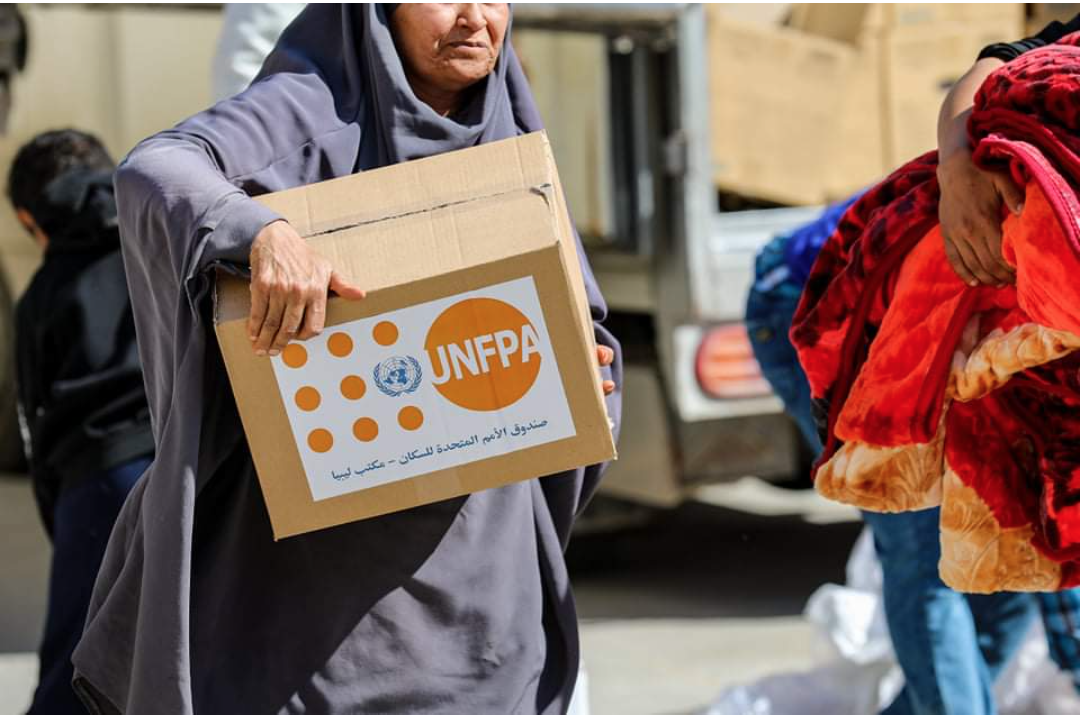
Photo Credit: Ahmed Eshaebi 2019
UNFPA has also supported the provision of lifesaving reproductive health services to 1,392 pregnant women in Tripoli and surrounding areas. On the 16th of June 2019, in partnership with Tripoli Health Services Department and Tripoli Crisis Management Team, UNFPA inaugurated the newly rehabilitated and equipped Weryemma maternity ward in Eastern Tripoli, to ensure provision of safe deliveries and access to emergency reproductive healthcare for mothers and newborns.
UNFPA provided medical equipment for safe deliveries and deployed three specialized teams composed of one obstetrician/gynecologist, one pediatrician, and one general practitioner to different areas. Each team provided 24/7 reproductive health services for a total population of 425,000 people who were living in Tajoura and Suq Al Jomaa municipalities. On the 15th of July, the first baby was born safely, and one newborn was admitted to the Neonatal Intensive Care Unit, making Weryemma polyclinic the first Primary Healthcare Center (PHC) to provide Emergency Obstetric and Newborn Care (EmONC) in Tripoli.
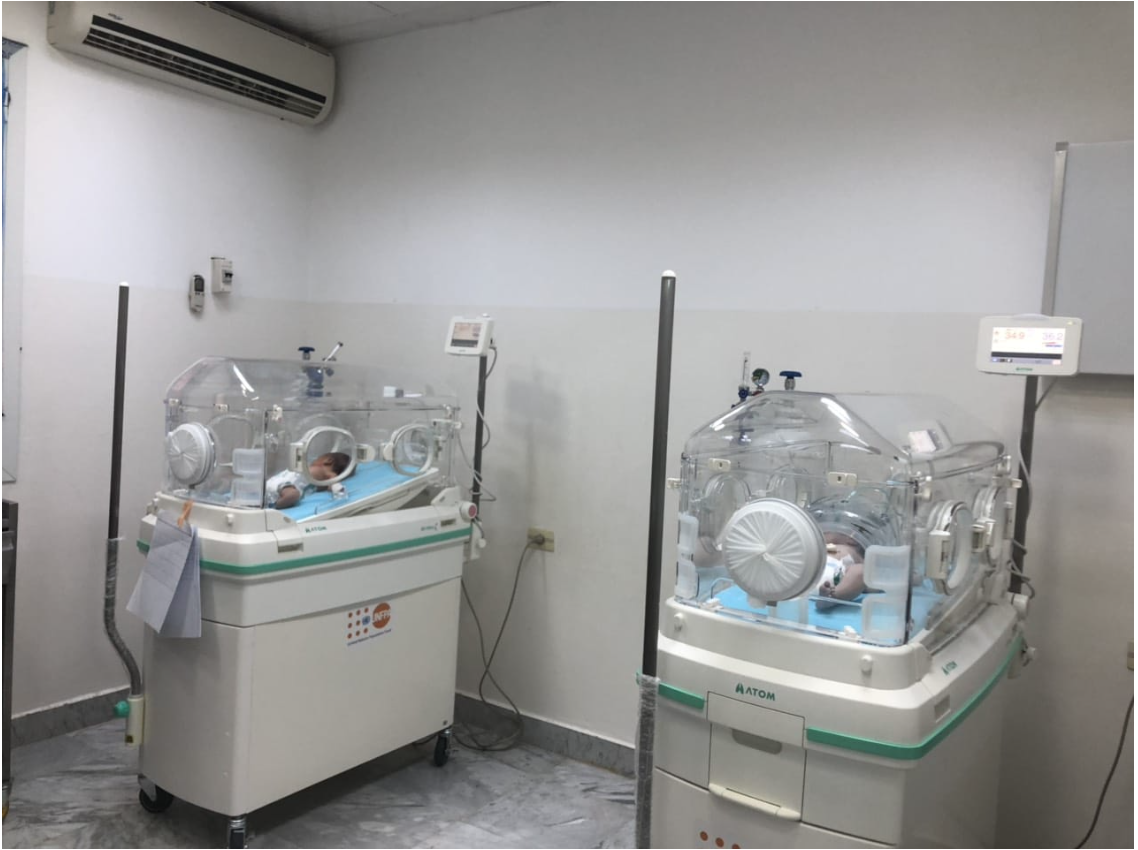
As the conflict continues to escalate, women and girls are continuously at risk of sexual exploitation and abuse either while fleeing the conflict areas where they might be forced to negotiate for safe passage, or while accessing humanitarian aid. On the 2nd of July 2019, a detention center in Tajoura was attacked, resulting in 53 migrants and refugees losing their lives and 130 being seriously injured.
Following the incident, UNFPA teams visited the Tajoura detention center to assess the health conditions of migrant women. They identified and screened 8 pregnant women and 5 lactating women. UNFPA provided multivitamin supplements and counseling, and distributed dignity kits to address the specific health and hygiene needs of women and girls, while liaising with partners to ensure urgent obstetric referrals were available as needed.
Overall, more than 270,000 women are currently in need of lifesaving protection and basic services throughout Libya and are at risk of gender-based violence, which is considered one of the cruelest violations of human rights. Refugees and migrant women and girls traveling through Libya face tremendous hardship, with many falling victim to trafficking, sexual violation, and lack of access to healthcare and other basic services.
Access to primary and secondary healthcare is disrupted and critical sexual and reproductive health (SRH) services are weak. Maternal health is of major concern, particularly in hard-to-reach areas of the South, which continue to suffer from severe shortages of specialized health workers and medical supplies. Alarming increases of preventable maternal deaths have been reported in the South.
Editor’s Picks — Related Articles:
#IAmToufah Makes the Message Clear: We Will Not Wish the Rape Crisis Away
Global Health Workforce Crisis: What to Do
The Fight for a Woman’s Right to Property After Divorce in Kenya
Gender-based violence (GBV) is widespread in Libya and has been exacerbated by the conflict, with approximately 40 per cent of surveyed women and men indicating GBV as either very common or common, as per UNFPA 2018 GBV Situation Analysis. Women or girls who dare to speak out risk being threatened, kidnapped, physically assaulted, raped, or killed. This, coupled with the lack of support from the judicial system, means that women and girls are highly unlikely to report crimes of GBV and sexual violence.[1]
Sexual and gender-based violence is among the top human rights violations for migrants and refugees in Libya and also constitutes a weapon of war used against Libyan women, girls, men, and boys. This fact was acknowledged in November 2018 with the addition of sexual violence as a reason for sanctions against Libya, as per the UN Security Council Resolution 2441.
UNFPA’s response to Libya’s protracted crisis is built around the humanitarian-development-peace nexus and is being implemented in the East, West and South of Libya. It entails a progressive shift from a focus on service delivery to institutional capacity building programs, supporting policies, systems, and standards for service provision, including primary health care centers, safe spaces for women, non-formal education, and youth centers. UNFPA adopts a community-based approach that engages youth and women as part of medium and longer term development for peace building and gender equality.
UNFPA is currently operating thanks to funding from Canada, the Central Emergency Response Fund (CERF) of the United Nations, the European Union, France, and UNFPA’s Emergency Fund.
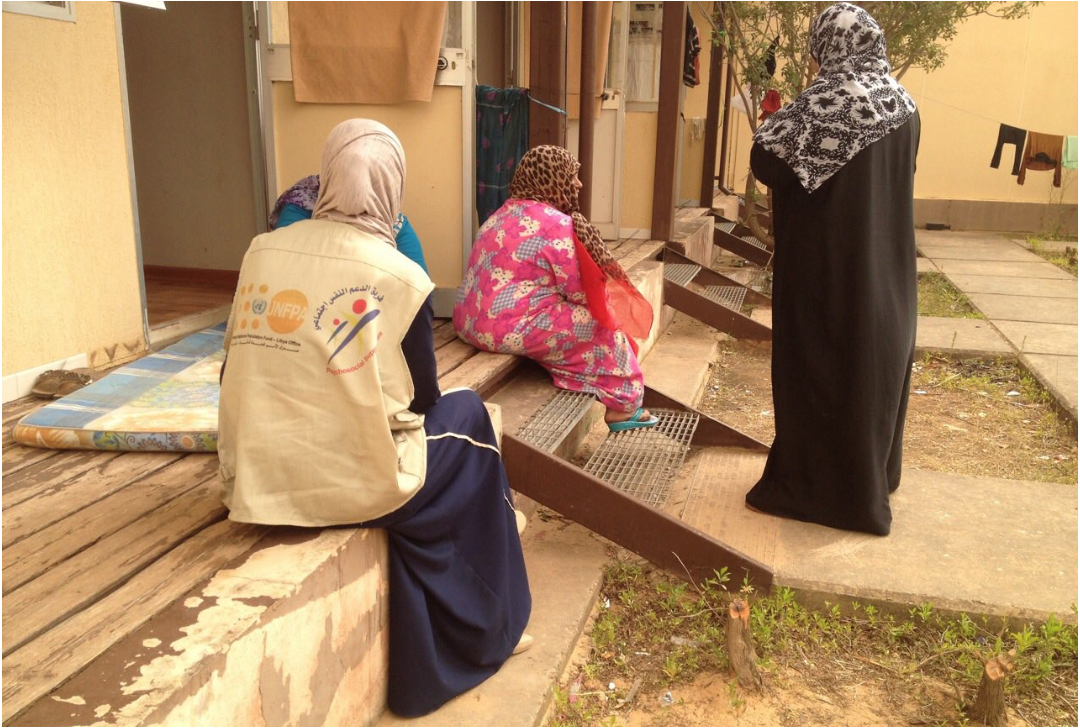
Photo Credit: PSS Team 2019
Through local civil society organizations, UNFPA is sustaining 4 Women Safe Spaces in Tripoli, Misrata, Benghazi, and Sabha, where vulnerable women and girls receive psychosocial support in individual and group sessions. They also have access to different training sessions to acquire livelihood skills and receive information on issues related to women’s rights, health, and other services in these spaces. This initiative has contributed to the empowerment and protection of vulnerable women in crisis-affected areas and has enabled more efficient detection of gender-based violence cases. Under UNFPA’s lead, the Gender-Based Violence (GBV) Sub-Sector has been coordinating the GBV response in Libya, in collaboration with and in support of various protection partners.
UNFPA is also leading the UN Youth Working Group for Libya, involving all relevant partners and stakeholders from civil society, national and international NGOs, UN agencies and government line ministries. This work is crucial in promoting the inclusion of adolescents and youth priorities in relevant national and local policies, while increasing opportunities for young people to exercise leadership and promote sustainable development, peace, and security.
The Y-PEER Network consists of peer educators and was created and championed by UNFPA. The organization has successfully expanded in Libya to over 1,000 members total in the East, West, and South of the country. Through the Y-PEER Network, UNFPA has been able to educate young women on sexual reproductive health (SRH) and GBV as well as on general life skills.
Thanks to new funding from the European Union, UNFPA will scale up its support to migrants and refugees throughout Libya and will improve access and quality of midwifery and nursing care services.
UNFPA is very concerned by the lack of funding for gender-specific issues in Libya and urges the donor community to scale-up funding for the protection of vulnerable women and girls in Libya.
[1] Libya Humanitarian Needs Overview 2019; UNFPA GBV Situational Analysis for Libya, April 2018.


